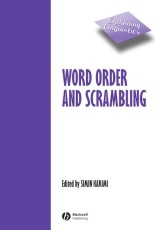Details

Word Order and Scrambling
Explaining Linguistics, Band 4 1. Aufl.
|
49,99 € |
|
| Verlag: | Wiley-Blackwell |
| Format: | |
| Veröffentl.: | 15.04.2008 |
| ISBN/EAN: | 9780470758250 |
| Sprache: | englisch |
| Anzahl Seiten: | 410 |
DRM-geschütztes eBook, Sie benötigen z.B. Adobe Digital Editions und eine Adobe ID zum Lesen.
Beschreibungen
<i>Word Order and Scrambling</i> introduces readers to recent research into the linguistic phenomenon called scrambling and is a valuable contribution to the fields of theoretical linguistics, psycholinguistics, and applied linguistics. <br /> <ul> <li style="list-style: none"><br /> </li> <li>Introduces readers to recent research into the linguistic phenomenon called scrambling, or free word order.</li> <li style="list-style: none"><br /> </li> <li>Explores major issues including factors responsible for word order variations, how scrambled constructions are processed, and whether variations are available in early child language development and in second language acquisition.<br /> </li> <li>Discusses a number of typologically diverse languages including Hindi, Japanese, and Navajo.<br /> </li> <li>Provides enlightening information on different aspects of word order variation and the consequences for our understanding of the nature of human language.</li> </ul>
<p>Acknowledgments ix</p> <p>Notes on Contributors x</p> <p>Introduction by Simin Karimi xiii</p> <p>1 Topic and Focus Scope Positions in Navajo 1<br /> <i>Kenneth Hale, Eloise Jelinek, and MaryAnn Willie</i></p> <p>2 Argument Scrambling, Operator Movement, and Topic Movement in Hungarian 22<br /> <i>Katalin E. Kiss</i></p> <p>3 Grammatical Relations in Tohono O’odham: an Instrumental Perspective 44<br /> <i>Mizuki Miyashita, Richard Demers, and Delbert Ortiz</i></p> <p>4 Bare Nominals: Non-Specific and Contrastive Readings under Scrambling 67<br /> <i>Veneeta Dayal</i></p> <p>5 On Object Positions, Specificity, and Scrambling in Persian 91<br /> <i>Simin Karimi</i></p> <p>6 Scrambling, Subscrambling, and Case in Turkish 125<br /> <i>Jaklin Kornfilt</i></p> <p>7 Does Russian Scrambling Exist? 156<br /> <i>John Frederick Bailyn</i></p> <p>8 A-Movement Scrambling and Options without Optionality 177<br /> <i>Shigeru Miyagawa</i></p> <p>9 Scrambling in Dutch: Optionality and Optimality 201<br /> <i>Helen de Hoop</i></p> <p>10 Word Order and (Remnant) VP Movement 217<br /> <i>Anoop Mahajan</i></p> <p>11 Non-Canonical Word Order: Topic and Focus in Adult and Child Tamil 238<br /> <i>Vaijayanthi Sarma</i></p> <p>12 L2 Acquisition of Japanese: Knowledge and Use of Case Particles in SOV and OSV Sentences 273<br /> <i>Noriko Iwasaki</i></p> <p>13 Scrambling and Processing: Dependencies, Complexity, and Constraints 301<br /> <i>Irina A. Sekerina</i></p> <p>14 WH-Movement versus Scrambling: the Brain Makes a Difference 325<br /> <i>Angela D. Friederici, Matthias Schlesewsky, and Christian J. Fiebach</i></p> <p>References 345</p> <p>Index 368</p>
"This collection provides thought-provoking material which will stimulate much future research. Perhaps the most fundamental question, addressed in the first six chapters, is the nature of the relation between scrambling and pragmatic features ... The issues raised in the book are important for any theory of syntax, language acquisition and/or the syntax-pragmatics interface." <b><i>Linguistics</i></b><br /> <p><br /> </p> <p>"This volume represents well the depth and the scope of current research on scrambling. It illustrates the rich and diverse phenomena the term ‘scrambling’ covers and shows nicely that they provide a wealth of information for the development of linguistic theory." <i><b>Mamoru Saito, Nanzan University</b></i><br /> </p> <p><br /> </p> <p>"I highly recommend this volume to anyone interested in issues on word order, particularly issues related to the ‘free word order’ phenomena sometimes collectively called ‘scrambling’. The book is an impressive collection of papers over a wide range of topics on word order in a number of typologically diverse languages, viewed mainly from syntax and semantics, but also incorporating insights from language acquisition and brain imaging." <b><i>Naoki Fukui,</i> <i>Sophia University</i></b></p>
<b>Simin Karimi </b>is Associate Professor of Linguistics at the University of Arizona. She is on the editorial board of the journal <i>Linguistic Analysis </i>and has published widely in journals such as <i>Linguistic Inquiry</i>, <i>The Linguistic Review</i>, and <i>Lexicology</i>.
<i>Word Order and Scrambling</i> introduces readers to recent research into the linguistic phenomenon called scrambling. The contributions, from some of the leading authorities in the field, explore major issues including the factors responsible for word order variations, how the scrambled constructions are processed, and whether these variations are available in early child language development and in second language acquisition. <br /> <p> The book discusses a number of typologically diverse languages including Persian, Japanese, and Navajo, and provides enlightening information on different aspects of word order variation and the consequences for our understanding of the nature of human language. <i>Word Order and Scrambling</i> is a valuable contribution to the fields of theoretical linguistics, psycholinguistics, and applied linguistics.</p>
"This collection provides thought-provoking material which will stimulate much future research. Perhaps the most fundamental question, addressed in the first six chapters, is the nature of the relation between scrambling and pragmatic features ... The issues raised in the book are important for any theory of syntax, language acquisition and/or the syntax-pragmatics interface." <b><i>Linguistics</i></b><br /> <p><br /> </p> <p>"This volume represents well the depth and the scope of current research on scrambling. It illustrates the rich and diverse phenomena the term ‘scrambling’ covers and shows nicely that they provide a wealth of information for the development of linguistic theory." <i><b>Mamoru Saito, Nanzan University</b></i><br /> </p> <p><br /> </p> <p>"I highly recommend this volume to anyone interested in issues on word order, particularly issues related to the ‘free word order’ phenomena sometimes collectively called ‘scrambling’. The book is an impressive collection of papers over a wide range of topics on word order in a number of typologically diverse languages, viewed mainly from syntax and semantics, but also incorporating insights from language acquisition and brain imaging." <b><i>Naoki Fukui,</i> <i>Sophia University</i></b></p>
Diese Produkte könnten Sie auch interessieren:

The Handbook of Hispanic Linguistics

von: José Ignacio Hualde, Antxon Olarrea, Erin O'Rourke

46,99 €

A Companion to Lesbian, Gay, Bisexual, Transgender, and Queer Studies

von: George E. Haggerty, Molly McGarry

38,99 €














